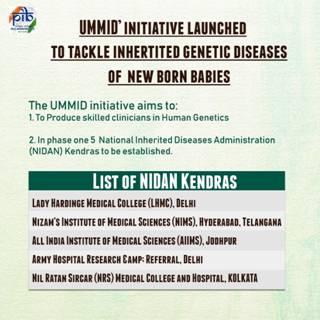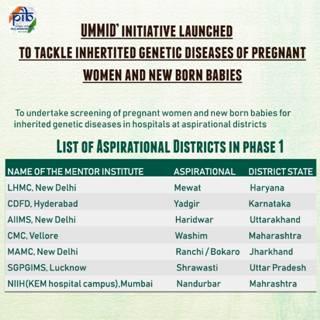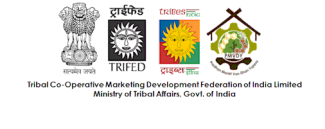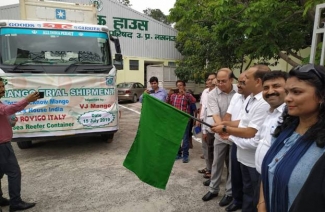

The Union Minister for Science & Technology, Earth Sciences and Health & Family Welfare, Dr. Harsh Vardhan today launched UMMID (Unique Methods of Management and treatment of Inherited Disorders) initiative and inaugurated NIDAN (National Inherited Diseases Administration) Kendras, which is being supported by Department of Biotechnology (DBT),M/o Science and Technology.
Speaking on the occasion in New Delhi, the Minister brought attention to the issue of ensuring proper treatment to children and creation of awareness amongst the masses and urged upon all to dwell more into finding solutions. Congratulating DBT for supporting this path-breaking initiative, Dr Harsh Vardhan said “With the program being implemented at government hospitals, people who cannot afford expensive care for genetic disorders will be benefited”. He further emphasized on the use of cutting edge scientific technology and molecular medicine for extending Universal Health Coverage for all.
Taking into account that congenital and hereditary genetic diseases are becoming a significant health burden in India, and realizing the need for adequate and effective genetic testing and counselling services. DBT has started the UMMID Initiative which is designed on the concept of ‘Prevention is better than Cure’. In India’s urban areas, congenital malformations and genetic disorders are the third most common cause of mortality in newborns. With a very large population and high birth rate, and consanguineous marriage favored in many communities, prevalence of genetic disorders is high in India, the UMMID initiative aims (i) to establish NIDAN Kendras to provide counselling, prenatal testing and diagnosis, management, and multidisciplinary care in Government Hospitals wherein the influx of patients is more, (ii) to produce skilled clinicians in Human Genetics, and (iii) to undertake screening of pregnant women and new born babies for inherited genetic diseases in hospitals at aspirational districts.
As a part of this initiative, in the first phase, five NIDAN Kendras have been established to provide comprehensive clinical care.
Training Centres at Madras Medical Mission- Chennai; SGPGIMS- Lucknow; CDFD – Hyderabad; AIIMS- New Delhi; MAMC- New Delhi; NIIH- Mumbai and CMC Vellore have been supported to provide training in Biochemical Genetics, Cytogenetics, Molecular Genetics, and Clinical Genetics to the clinicians from government hospitals. Screening of 10,000 pregnant women and 5000 new born babies per year for inherited genetic diseases will be taken up at the following seven aspirational districts.
The department is planning to expand the program and establish more Nidan Kendras in other parts of the country, train more clinicians in clinical genetics and cover more aspirational districts for screening of pregnant women and new born babies for inherited genetic diseases to provide comprehensive clinical care, in the next phase under this UMMID initiative.
The Government of India has launched the National Health Policy, 2017 aiming to shift focus from “sick-care” to “wellness”. UMMID initiative shall work towards achieving wellness by promoting prevention of genetic diseases.
नवजात शिशुओं में आनुवांशिक रोगों से निपटने के लिए “उम्मीद” पहल का शुभारंभ
केंद्रीय विज्ञान एवं प्रौद्योगिकी, पृथ्वी विज्ञान तथा स्वास्थ्य एवं परिवार कल्याण मंत्री डॉ. हर्षवर्धन ने आज उम्मीद (वंशानुगत विकारों के उपचार एवं प्रबंधन की विलक्षण पद्धतियां ) पहल का शुभारंभ किया तथा निदान (राष्ट्रीय वंशानुगत रोग प्रबंधन) केंद्रों का उद्घाटन किया। इन्हें विज्ञान एवं प्रौद्योगिकी मंत्रालय के जैव प्रौद्योगिकी विभाग (डीबीटी) द्वारा सहायता प्रदान की जा रही है।
नई दिल्ली में इस अवसर पर अपने विचार प्रकट करते हुए विज्ञान एवं प्रौद्योगिकी मंत्री ने बच्चों का उचित इलाज सुनिश्चित करने और जनता के बीच जागरूकता फैलाने के प्रति ध्यान आकर्षित करने तथा इसका समाधान तलाशने के लिए सभी से इस बारे में विचार करने का अनुरोध किया। इस अग्रणी पहल को सहायता देने के लिए डीबीटी को बधाई देते हुए डॉ. हर्षवर्धन ने कहा, “ यह कार्यक्रम सरकारी अस्पतालों में कार्यान्वित किया जा रहा है इसलिए अनुवांशिक विकारों के लिए महंगा इलाज कराने में असमर्थ लोगों को इससे लाभ होगा।” उन्होंने सभी के लिए संपूर्ण स्वास्थ्य कवरेज उपलब्ध कराने के लिए अत्याधुनिक वैज्ञानिक प्रौद्योगिकी और आणविक औषधियों के उपयोग पर बल दिया।
जन्मजात और आनुवांशिक रोग भारत में बहुत बड़ा स्वास्थ्य संबंधी बोझ बनते जा रहे हैं, इसी को ध्यान में रखते हुए तथा उपयुक्त और कारगर आनुवांशिक परीक्षण एवं परामर्शी सेवाओं की जरूरत को महसूस करते हुए डीबीटी ने उम्मीद पहल का शुभारंभ किया है जो “परहेज, इलाज से बेहतर है” की अवधारणा पर आधारित है। भारत के शहरी क्षेत्रों में जन्मजात विकृतियां और आनुवांशिक विकार नवजात शिशुओं में मृत्युदर का तीसरा सबसे बड़ा आम कारण है। बहुत बड़ी आबादी और उच्च जन्म दर तथा बहुत से समुदायों में सजातीय विवाहों का पक्ष लिए जाने के मद्देनजर भारत में आनुवांशिक विकारों का प्रचलन बहुत अधिक है। ऐसे में उम्मीद पहल का लक्ष्य (i) मरीजों की ज्यादा तादाद वाले सरकारी अस्पतालों में परामर्श, प्रसवपूर्व परीक्षण और निदान, प्रबंधन तथा बहुविषयक देखरेख उपलब्ध कराने के लिए निदान केंद्रों की स्थापना करना, (ii) मानव आनुवांशिकी में कुशल निदानविद् (क्लीनिशियन) तैयार करना और (iii) अस्पतालों और लक्षित जिलों में गर्भवती महिलाओं तथा नवजात शिशुओं की आनुवांशिक रोगों के लिए जांच करना है।
उम्मीद पहल के शुरूआती चरण में बड़े स्तर पर नैदानिक सेवाएं उपलब्ध कराने के लिए पांच निदान केन्द्र बनाये गये हैं।
चेन्नई के मद्रास मेडिकल मिशन, लखनऊ के एसजीपीजीआईएमएस, हैदराबाद के सीडीएफडी, नई दिल्ली के एम्स, नई दिल्ली के मौलाना आजाद मेडिकल कॉलेज, मुंबई के एनआईआईएच और वेल्लोर के क्रिश्चिन मेडिकल कॉलेज को जैव रसायन आनुवाशिंकी, कोशिका आनुवांशिकी, आण्विक अनुवांशिकी और क्लिनिकल जेनेटिक्स में प्रशिक्षण प्रदान करने के लिए मदद दी गई है। अभियान चलाये जाने के लिए निम्नलिखित सात जिलों में आनुवांशिक बीमारियों का पता लगाने के लिए प्रतिवर्ष 10,000 गर्भवती महिलाओं और 5000 नवजात शिशुओं की जांच की जाएगी।
स्वास्थ्य विभाग उम्मीद अभियान को विस्तार देने के लिए तथा देश के अन्य हिस्सों में और अधिक निदान केन्द्र खोलने की योजना बना रहा है। इसके अलावा कई क्लिनिकल जेनेटिक्स में ज्यादा से ज्यादा प्रयोगशाला कर्मियों को प्रशिक्षण देने की योजना है, ताकि उम्मीद अभियान के अगले चरण में आनुवांशिक बीमारियों का पता लगाने के लिए अधिक संख्या में गर्भवती महिलाओं और नवजात शिशुओं की जांच की जा सके।
भारत सरकार ने अपनी नई राष्ट्रीय स्वास्थ्य नीति-2017 में रोगों के निदान की बजाय वेलनेस को ज्यादा महत्व दिया है। उम्मीद पहल आनुवांशिक रोगों की रोकथाम को बढ़ावा देकर वेलनेस प्राप्त करने की दिशा में काम करेगी।











